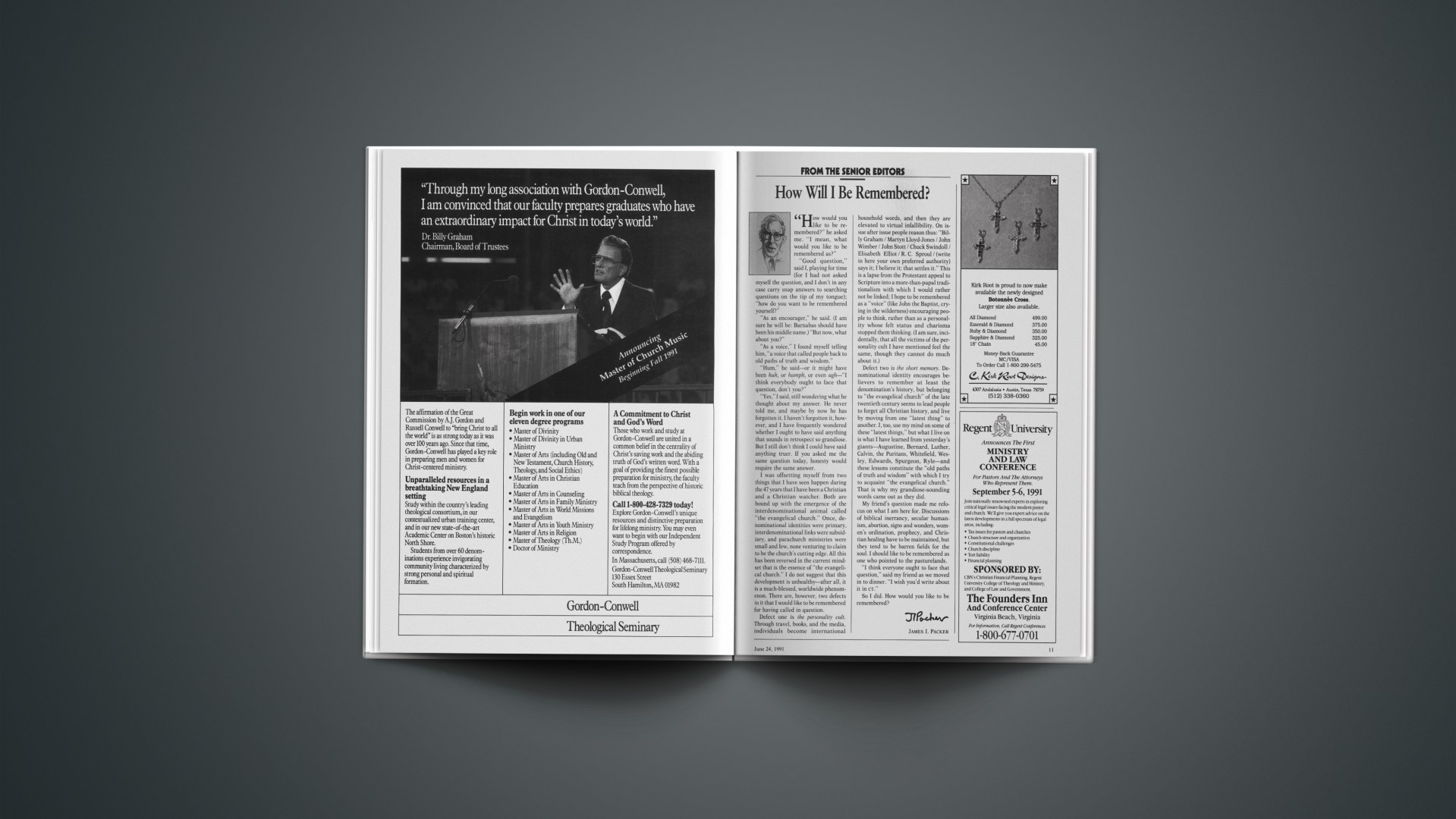“How would you like to be remembered?” he asked me. “I mean, what would you like to be remembered as?” “Good question,” said I, playing for time (for I had not asked myself the question, and I don’t in any case carry snap answers to searching questions on the tip of my tongue); “how do you want to be remembered yourself?”
“As an encourager,” he said. (I am sure he will be: Barnabas should have been his middle name.) “But now, what about you?”
“As a voice,” I found myself telling him, “a voice that called people back to old paths of truth and wisdom.”
“Hum,” he said—or it might have been huh, or humph, or even ugh—“I think everybody ought to face that question, don’t you?”
“Yes,” I said, still wondering what he thought about my answer. He never told me, and maybe by now he has forgotten it. I haven’t forgotten it, however, and I have frequently wondered whether I ought to have said anything that sounds in retrospect so grandiose. But I still don’t think I could have said anything truer. If you asked me the same question today, honesty would require the same answer.
I was offsetting myself from two things that I have seen happen during the 47 years that I have been a Christian and a Christian watcher. Both are bound up with the emergence of the interdenominational animal called “the evangelical church.” Once, denominational identities were primary, interdenominational links were subsidiary, and parachurch ministries were small and few, none venturing to claim to be the church’s cutting edge. All this has been reversed in the current mindset that is the essence of “the evangelical church.” I do not suggest that this development is unhealthy—after all, it is a much-blessed, worldwide phenomenon. There are, however, two defects in it that I would like to be remembered for having called in question.
Defect one is the personality cult. Through travel, books, and the media, individuals become international household words, and then they are elevated to virtual infallibility. On issue after issue people reason thus: “Billy Graham / Martyn Lloyd-Jones / John Wimber / John Stott / Chuck Swindoll / Elisabeth Elliot / R. C. Sproul / (write in here your own preferred authority) says it; I believe it; that settles it.” This is a lapse from the Protestant appeal to Scripture into a more-than-papal traditionalism with which I would rather not be linked; I hope to be remembered as a “voice” (like John the Baptist, crying in the wilderness) encouraging people to think, rather than as a personality whose felt status and charisma stopped them thinking. (I am sure, incidentally, that all the victims of the personality cult I have mentioned feel the same, though they cannot do much about it.)
Defect two is the short memory. Denominational identity encourages believers to remember at least the denomination’s history, but belonging to “the evangelical church” of the late twentieth century seems to lead people to forget all Christian history, and live by moving from one “latest thing” to another. I, too, use my mind on some of these “latest things,” but what I live on is what I have learned from yesterday’s giants—Augustine, Bernard, Luther, Calvin, the Puritans, Whitefield, Wesley, Edwards, Spurgeon, Ryle—and these lessons constitute the “old paths of truth and wisdom” with which I try to acquaint “the evangelical church.” That is why my grandiose-sounding words came out as they did.
My friend’s question made me refocus on what I am here for. Discussions of biblical inerrancy, secular humanism, abortion, signs and wonders, women’s ordination, prophecy, and Christian healing have to be maintained, but they tend to be barren fields for the soul. I should like to be remembered as one who pointed to the pasturelands.
“I think everyone ought to face that question,” said my friend as we moved in to dinner. “I wish you’d write about it in CT.”
So I did. How would you like to be remembered?
JAMES I. PACKER










